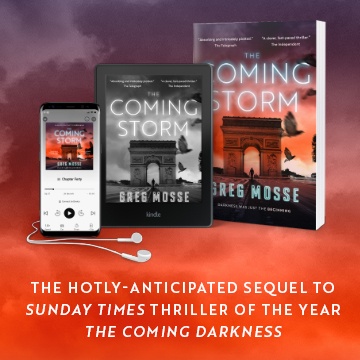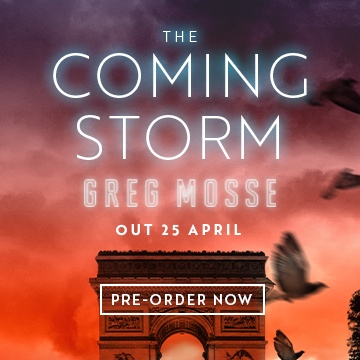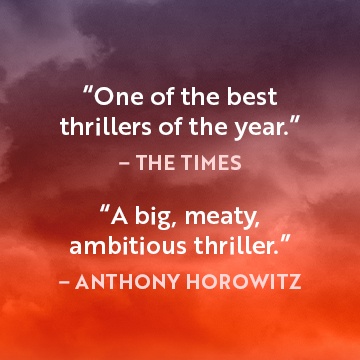 Exclusive extracts from OxCrimes — Yesterday saw the release of a special crime fiction anthology by Profile Books. OxCrimes brings you short stories by 27 top crime authors and will benefit the global anti-poverty charity Oxfam. To support the launch, we’re working with Profile to bring you extracts from some of the pieces in the book. We’ve already had ones by Adrian McKinty and Martyn Waites, and today we’re joined by Christopher Fowler.
Exclusive extracts from OxCrimes — Yesterday saw the release of a special crime fiction anthology by Profile Books. OxCrimes brings you short stories by 27 top crime authors and will benefit the global anti-poverty charity Oxfam. To support the launch, we’re working with Profile to bring you extracts from some of the pieces in the book. We’ve already had ones by Adrian McKinty and Martyn Waites, and today we’re joined by Christopher Fowler.
Now here’s an author who’s a favourite here at Crime Fiction Lover, particularly thanks to his Bryant & May mysteries. The series might be 11 books in, but he always manages to find a new twist to keep London’s Peculiar Crimes Unit on its toes. In his short story The Caterpillar Flag, which starts below, we’re off to southern Spain. Once you’ve enjoyed this piece by Christopher Fowler, don’t forget to grab yourself a copy of OxCrimes – £9.99 in paperback or £7.99 as an eBook. Go on, it’s for charity.
 The Caterpillar Flag by Christopher Fowler
The Caterpillar Flag by Christopher Fowler
‘So, where are you off to, then?’ Lily heard the taxi driver who was taking them to Victoria Station ask. She could only see the back of his head through the glass. It was as smooth and hard as a pebble.
‘Spain,’ her father replied. ‘We’re moving there.’
‘Oh, Spain.’ There was the disapproval of experience in his voice. ‘Let me give you a tip, mate. I’ll tell you what happens to people when they move to Spain. All they end up doing is reading and drinking, and they slowly fall apart. It ruins them. Reading and drinking. It’ll happen to you too. That’s what always happens.’
Lily’s father did not give the driver a tip in return for his sage advice.
The village of Cadilla, in the mountains above Ronda, isn’t famous for much; it sells raspberry-coloured gin and small plates of dried acorn-fed ham, and there are tiny, brightly coloured birds on all the telephone poles. The houses are whitewashed and shuttered against the searing heat, and have blue and yellow geckos painted on the walls. The wives wash their front steps and balconies first thing every morning, and beat their rugs against the walls of their houses, as the wives of England once did. From her open window Lily could always hear someone talking or sweeping. The Spanish children played ball games in the street and the English ones stayed inside on their Playstations. By May it was so hot you could cook an egg on the iron plate that covered the old well in the plaza. There was a hotel with eight rooms, a cobbled town square where the older boys hung out and fishtailed their bicycles past Eduardo’s café, a church the English never attended except at Christmas, and a restaurant the locals wouldn’t use because the owner once cheated his neighbour in a game of cards. Everyone knew each other.
It was early summer in 2012. Lily was being taken from Manchester to Cadilla because she was prone to pleurisy and the air here was hot and dry. She was nearly nine years old. Her parents had taken a one-year rental on a small white house with a tiny sun-baked yard edged about by orange trees in glossy red earthenware pots. After a month her pale skin freckled and darkened to a smooth caramel, her chest cleared and her nights passed silent and uninterrupted.
From almost anywhere in the town the view was framed by two mountains, one topped with an actual ruined castle. Between them were miles of green fields and brown rocks, and beyond those an azure ribbon of sea separated Spain from the coast of Africa, where a town called Tangiers was so fiercely illuminated at night that it blotted out the starlight above it.
Lily’s parents had their own contradictory reasons for moving. Geoffrey had been made redundant from the wine wholesaler he worked for in Manchester, and had taken a new job exporting sherry to England. Every Tuesday morning he travelled to Madrid or Jerez or London, returning on Thursday evening. He said that coming to Cadilla was a fresh start for them. Lily’s mother Paula ran an online auction site selling discounted designer handbags, and she said they had moved here so that they could stay together as a family and her father wouldn’t have the same temptations, whatever that meant.
Lily’s new school was six kilometres away, and they had arranged for the yellow school bus to collect her from the town square each morning, along with four other ex-pat children.
In Manchester, Lily’s mother had never liked her going out, but here it seemed she was forever pushing her out of doors. They were all still at the point where the sun was a novelty. Almost at once, an astonishing thing happened. The family started having meals together, especially at the weekends. They sat in the shaded town square drinking thick dark cortados and sharp orange juice, and had crispy-edged eggs brought to them in little frying pans. Paula and Geoffrey even started holding conversations that didn’t end in anger. Lily slid down in her seat and looked from one parent to the other in goggle-eyed satisfaction.
Whenever they went to Eduardo’s café, there was always one other table occupied. Celestia was a tall, elegant Englishwoman in her 70s who had once lived in London, in a place called Shepherd’s Bush. She had moved here because of a divorce, a family fight, a devotion to bullfights and a passion for chain-smoking cigarillos. She knew everyone in town, including the man who had once robbed her house, and who turned out to live right next door. His name was Paolo, and he had a sullen, burned look. She gave his children money to show that he had been forgiven, and her ostentatious displays of largesse brought a certain amount of distant respect, along with a little resentment. She explained that she did not miss Shepherd’s Bush, because who in their right mind would, but she did on occasion miss England…
To carry on reading, click here.
© Christopher Fowler 2014
This extract from the beginning of The Caterpillar Flag by Christopher Fowler is taken from OxCrimes: 27 Killer Stories from the Cream of Crime Writers published 15 May by Profile Books at £9.99 paperback/£7.99 ebook.
OxCrimes will be available from branches of Oxfam Bookshops as well as Amazon UK, Foyles, Waterstones and Amazon US and all good online and high street retailers.
Note: With previous books OxTravels and OxTales raising over £250,000 since their 2009 publication, Oxfam is hoping OxCrimes will raise even more, helping to tackle poverty and suffering around the world. Visit Oxfam’s emergency Response pages here to find out more about how you can help.








